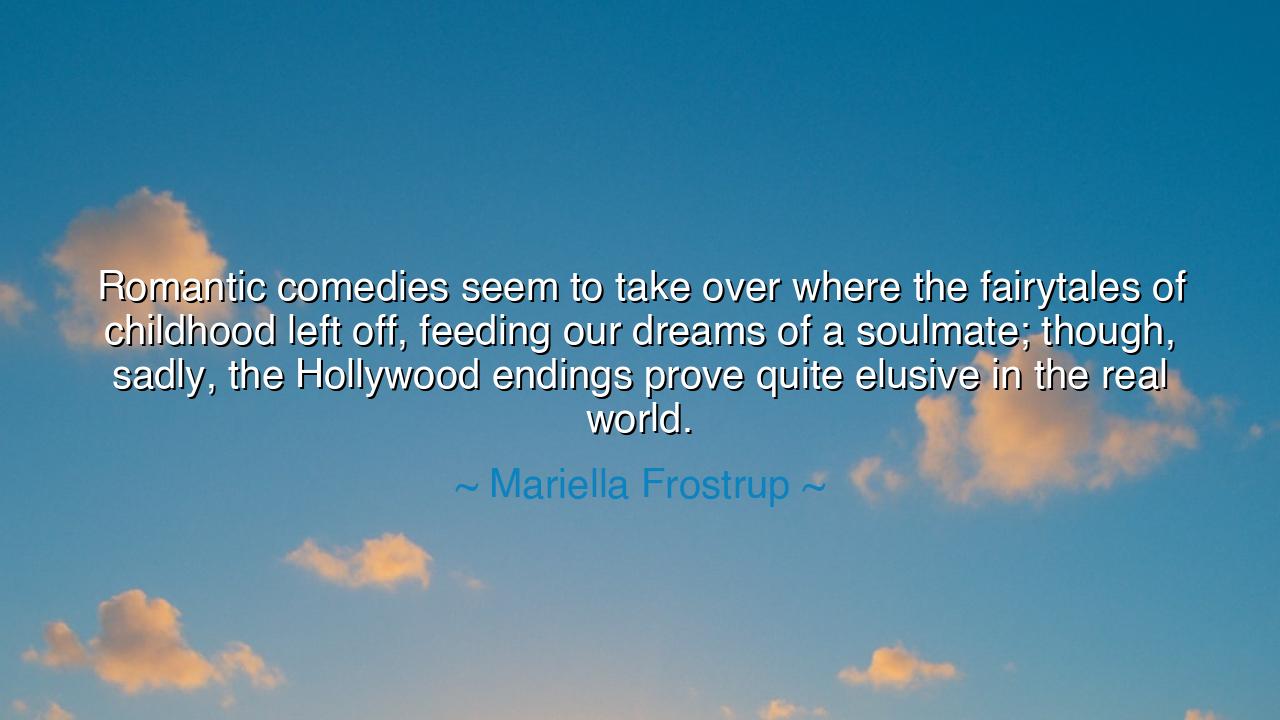
Romantic comedies seem to take over where the fairytales of
Romantic comedies seem to take over where the fairytales of childhood left off, feeding our dreams of a soulmate; though, sadly, the Hollywood endings prove quite elusive in the real world.






"Romantic comedies seem to take over where the fairytales of childhood left off, feeding our dreams of a soulmate; though, sadly, the Hollywood endings prove quite elusive in the real world." These words by Mariella Frostrup strike a chord deep within the heart of all who have dared to dream of romance and love. In them lies a profound truth—the fairytales of our youth shape the lens through which we view the world of relationships. From the moment we are children, we are told stories of prince charming, curses, and happy endings, which nurture within us a longing, a belief that love is a thing of magic and destiny. Yet as we grow and step into the world of adulthood, we begin to realize that the fairy tales we were told were not meant to prepare us for the complexities of real love, but rather to ignite the dreams of what might be possible. The world of romantic comedies offers us a familiar escape—an echo of those childhood stories, yet it is one that fades swiftly when confronted by the realities of human connection.
From the ancient tales told around campfires to the epics of old, the story of love has always been a central theme. Consider the Greek myths, where gods and mortals alike strove for love, sometimes with tragic and often unattainable ends. The gods themselves, though powerful, were not immune to the whims of fate and emotion. Persephone and Hades, for instance, were bound by a love that transcended the natural world, yet it was a love full of longing, separation, and sorrow. The ancient poets and storytellers did not promise easy resolutions, for they knew that true love is not a simplistic dream, but a journey fraught with trials, growth, and sacrifice. These ancient tales served as guides, not to eternal bliss, but to the recognition of love’s complexity.
Romantic comedies, in their essence, act as the modern-day descendants of these age-old tales. They transport us into a world where love is the central force, often magical and unyielding, where the obstacles are simple and the happy endings guaranteed. They are the reflection of our childhood fantasies, promising that the right person will come along, that love will conquer all, and that everything will fall into place in the end. Yet, much like the fairytales of old, they exist to feed a yearning, to fulfill an emotional need, rather than to portray the full breadth of what love truly is. For the Hollywood endings we so often see are elusive when we are faced with the realities of life—where true love requires patience, understanding, and growth.
Consider the story of Romeo and Juliet, those star-crossed lovers whose story has been retold countless times. Their love, passionate and pure, is overshadowed by the violence of their families, the uncontrollable forces of fate. The tale, while romantic, is tragic—an ending not found in the easy comfort of Hollywood, but in the bitter pain of loss and misunderstanding. And yet, their love remains eternal in our hearts, not because of its ending, but because of the intensity of the human emotion it evokes. Shakespeare, in his genius, did not promise us a tidy resolution, but he did offer a glimpse into the heart of love—beautiful, fleeting, and full of sacrifice.
The ancient wisdom tells us that love is not a simple prize, nor is it something that can be won at the end of a journey. Love, true and enduring, is not about the moment of meeting, but about the sacrifice and commitment that follow. Aristotle, in his reflections on friendship and love, described the highest form of love as one that seeks the good of the other, one that grows and evolves through mutual respect and effort. This is the love that transcends the fairy tale. It is not found in the perfect meet-cute, nor in the perfect kiss, but in the hard work of navigating life’s challenges together. True love, he suggested, is the love that becomes stronger through difficulty, not weaker.
In the world today, we must take the lessons from these ancient stories and apply them to our lives. While we may long for the fairytale romance, we must remember that love, in its deepest form, is not about escaping into a world of perfect endings, but about facing life with another, learning and growing together. As Frostrup suggests, romantic comedies feed our dreams of a soulmate, but we must reconcile these dreams with the realities of love—where the perfect ending is often replaced with something much richer: a love that is imperfect, messy, and, ultimately, human.
So, let us take this wisdom into our hearts and our lives. Dream, yes, but also live with awareness. Understand that the path to true love is often uncertain and filled with obstacles, but it is through these very struggles that love prospers. Do not let the elusive Hollywood endings fool you into thinking that love should be perfect. Instead, embrace the messy, challenging, and beautiful truth that love, in all its forms, is about connection, growth, and the willingness to journey together through the storms and the sunshine.






AAdministratorAdministrator
Welcome, honored guests. Please leave a comment, we will respond soon